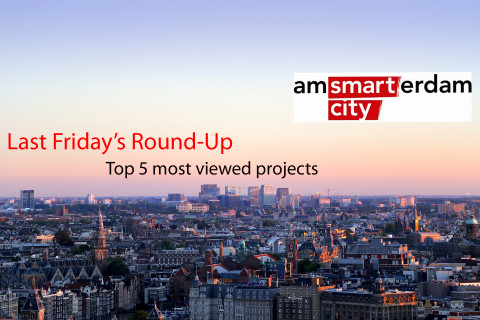Data are a key asset to smart cities, so we dived into Amsterdam Smart City´s data set and did some research on the most popular projects added in February. These projects were added by Amsterdam Smart City’s community members.
Data are a key asset to smart cities, so we dived into Amsterdam Smart City´s data set and did some research on the most popular projects added in February. These projects were added by Amsterdam Smart City’s community members, who make Amsterdam a smarter and future proof city every day. Do you have an innovative project that the community should know about? Please add and share your project to the community.
1. The Peaceful Citizen Stress is the most common occupational disease in the Netherlands and probably throughout the world. The peaceful citizen project detects stress by using smart phone sensors. Based on code from the Oxford Universities Center for Evidence Based Medicine the Peaceful Citizen project aims at reducing stress with specific mindfulness techniques. Chill out and share this project.
2. Movby
An attitude change to consumption has taken place recent years with the upcoming of the sharing economy or collaborative consumption. Movby’s objective is to connect people with local ride owners to share their transport means. By providing an online platform ride owners and potential ride renters can meet each other even when they are geographically dispersed. Interested in this project? Visit Movby’s project page and spread the word.
3. Toogethr
In 2016 there was a 12% growth in traffic jams, in 2015 that growth was even bigger (20%). One solution for this problem is ridesharing. Toogethr, a Dutch startup, developed a platform for ridesharing that removes all traditional barriers. By automatically matching colleagues to each other based on a set of variables, ridesharing becomes fun and easy. This project recently won The Hague 2017 Innovators public prize. Beat traffic jams and visit this project’s page.
4. Smart Port of Amsterdam The Port of Amsterdam is one of the biggest ports in Europe, every day bulk carriers that lie to deep for IJmuiden’s locks transfer their load onto smaller ships. Using sensors to improve shipping movement and optimizing rigging schedules is this project’s aim. Unlike human beings sensors work 24/7 and the data they provide is used to optimize the human part of the job. Shorter and faster rigging was the result of this project and we are curious to see what their results will be in the future. Check this project and see what you can learn from using sensory data.
5. Electronic park sign
Many tourist visit Amsterdam by coach however, parking space is limited in Amsterdam’s historic center. The electronic parking project has found a solution, a parking sign that communicates with the coach drivers. The sign is activated when a coach stops at the parking zone and clock starts counting down as an indicator for the driver when to depart. Also the signs are able to provide information to the drivers for optimizing their route. Do you know a sport where these signs are an absolute necessity? Check out this project and contact the owners.





